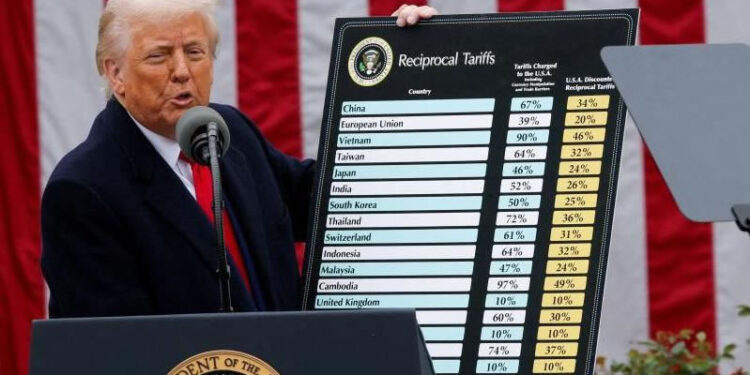The mountain-ringed nation of Lesotho faces an existential threat to its primary industry following Washington’s shocking decision to impose punishing 50% import duties, the most severe single-nation penalty in the new tariff regime.
“Reciprocal tariffs” announced by the Trump administration have sent shockwaves across Southern Africa, with Madagascar (47%), Mauritius (40%), Botswana (37%), Equatorial Guinea (30%), and regional powerhouse South Africa (30%) all facing above-baseline rates. But analysts agree the landlocked kingdom stands to suffer most acutely.
With textiles constituting nearly 80% of export earnings and the US labelling Lesotho among “the worst offenders” for trade imbalances, industry leaders predict catastrophic consequences. “The textile and apparel industry is going to die,” warned Thabo Qhesi, head of Lesotho’s private sector association, in a grim assessment.
The numbers paint a dire picture: some 35,000 direct jobs, representing nearly 10% of formal employment hang in the balance in a nation where per capita GDP barely exceeds $1,100. Factory floors that once buzzed with activity producing denim for American retailers may soon fall silent.
“Before the introduction of the reciprocal tariffs, investors enjoyed exporting goods to the US market duty-free,” Qhesi noted bitterly. The new reality could trigger a domino effect, potentially collapsing ancillary sectors from logistics to urban housing markets that cater to factory workers.
Regional Neighbours Scramble for Responses
Madagascar’s trade ministry confirmed urgent consultations with US diplomats to “seek clarification and explore possibilities for adjusting these new tariff barriers,” while vowing to deploy “all diplomatic and commercial levers” to soften the blow.
South African President Cyril Ramaphosa struck a statesmanlike tone, calling the measures “a barrier to trade and shared prosperity” while emphasising the need for renegotiated terms with America, currently Pretoria’s second-largest trading partner.
The automotive sector appears particularly vulnerable, with an additional 25% vehicle tariff poised to strike South Africa’s $1.88 billion car export business. Industry analysts predict immediate production cuts at major Eastern Cape manufacturing plants.
Searching for Solutions in Uncertain Times
Trade expert Parks Tau painted a bleak picture for regional economies, predicting the measures would “literally devastate” smaller nations like Lesotho. His proposed solution? A coordinated Southern African response through existing trade blocs and accelerated intra-continental commerce.
Economist Raymond Parsons warned of broader contagion effects: “These tariffs will disrupt global value chains, invite retaliation, ignite inflation, dampen world economic growth, and prompt repricing of risks in financial markets.” His prescription includes urgent trade diversification.
But veteran analyst Dawie Roodt injected sobering realism: “When every affected nation scrambles for new partners simultaneously, the laws of supply and demand work against us. The road ahead will be punishing.”


































